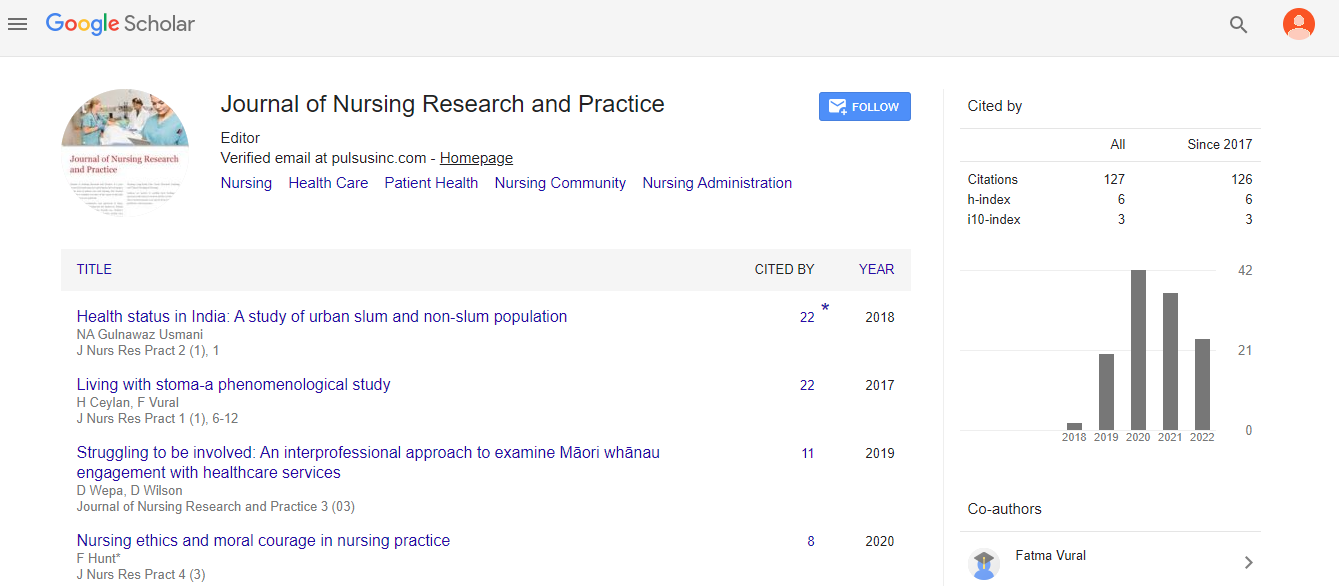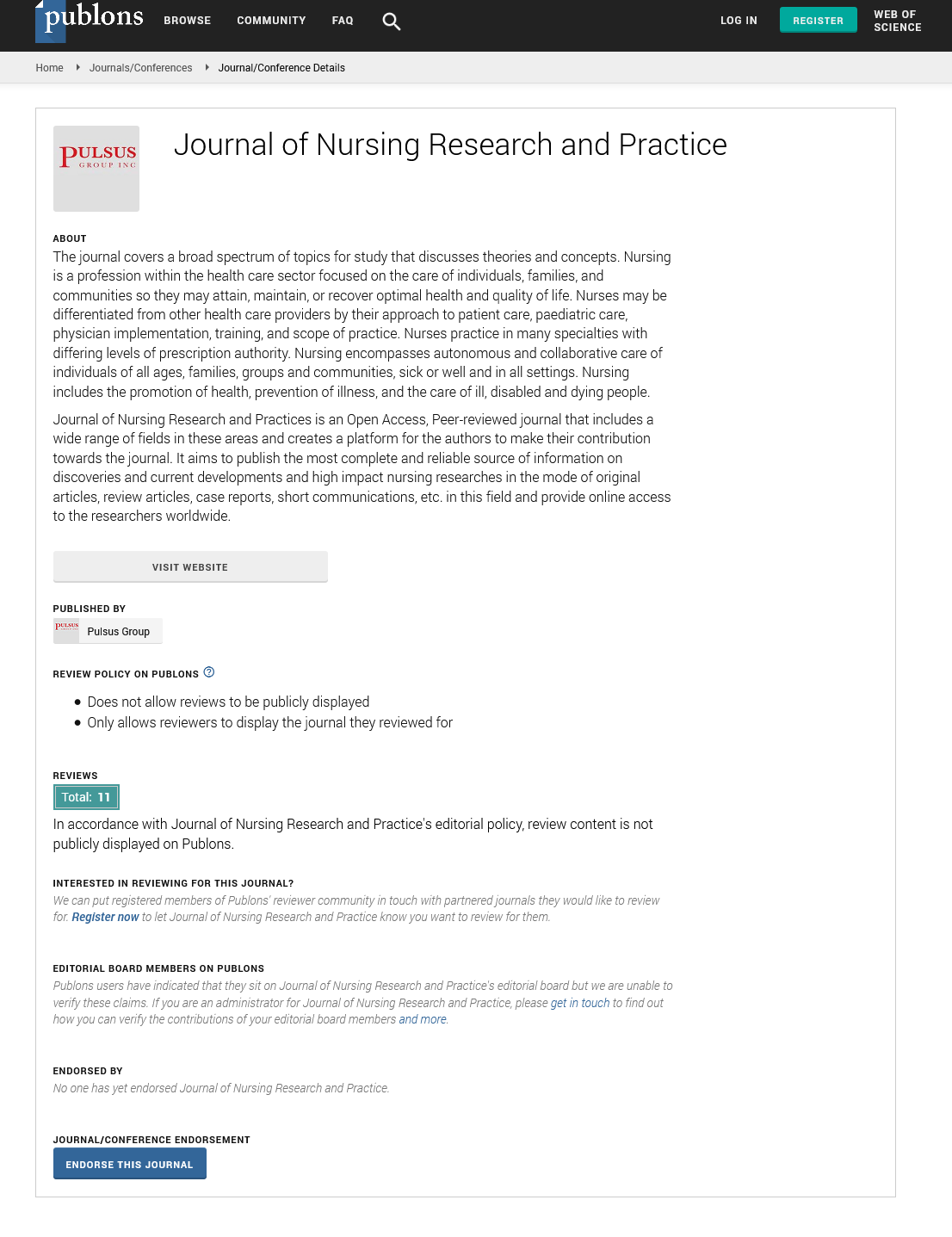Current issues in nursing and healthcare
Received: 15-Nov-2017 Accepted Date: Nov 17, 2017; Published: 27-Nov-2017
Citation: Malaska RH. Current issues in nursing and healthcare. J Nurs Res Pract. 2017;1(1): 20.
This open-access article is distributed under the terms of the Creative Commons Attribution Non-Commercial License (CC BY-NC) (http://creativecommons.org/licenses/by-nc/4.0/), which permits reuse, distribution and reproduction of the article, provided that the original work is properly cited and the reuse is restricted to noncommercial purposes. For commercial reuse, contact reprints@pulsus.com
As a veteran nurse I am committed to lifelong ongoing education to better my practice and provide the best quality safe care to our patients. I urge you to do the same as our work has just begun in finding workable healthcare and nursing solutions for our patients nationally in the USA and globally.
There are many urgent issues that need to be addressed as identified by stakeholders nationally and internationally. The World Health Organization (WHO) is concerned with global population health and encourages healthcare providers to work collaboratively for solutions to improve the lives of populations around the world especially the underserved. Many of the basics that we take for granted in our daily lives, clean water, food, clothing, housing, access to healthcare and basic immunizations (flu and pneumonia) that protect us from getting sick are struggles for millions around the world. We must collaborate to provide relief, support, education, and protection for peoples of the world because it impacts all of us even though it is the other end of the world.
The Institute for Healthcare Improvement (IHI) encourages better leadership behaviors including treating employees with respect, which according to Harvard Business school experts “has a more powerful effect on employees’ health, happiness, and engagement” more than any other leadership behaviors [1]. This is not a new concept, as Watson’s [2] theory of human caring, transpersonal caring lays the foundation for and provides a conceptual framework to guide us on how to treat each other and provide caring, compassionate, therapeutic care to our patients. As human beings, when we are shown caring, kindness, respect, and understanding it makes us feel good inside and out. Essentially, when we are appreciated, the good feelings generated have a direct impact on performance which leads to better care and treatment of our patients, better outcomes. Is this not what we (nurses) are trained to show our patients, so why not extend the same behaviors to each other? It makes sense that as leaders we should role model caring, respectful, supportive behaviors to our caregivers. This supports “civility” and a healthy work environment, the IHI [1] ultimate goal to “finding joy in our work.” The IHI in its continuing efforts to address this “epidemic” has partnered with experts to provide training in the coming year on strategies and solutions to “turn burnout into engagement,” using online education webinars to reach a global audience [1]. The IHI has a wide variety of educational webinars related to self-care, patient safety, and quality of care, to assist nurses and healthcare providers personally and professionally.
WHO urges us to decrease our mental stress, “good mental health enables people to realize their potential, cope with the normal stresses of life, work productively, and contribute to their communities” [3]. Every day we are reminded of the violence in the United States that has become a part of our daily lives, loss of lives majority of which stems from mental health issues. People, regardless of professional or social status, education or experiences are suffering silently, many have poor coping skills; adding to this problem, a system lacking in adequate support and poor access to mental health care. Nurses, healthcare providers are not immune to this growing problem. The WHO cites a negative work environment including “commonly reported” bullying and harassment in the workplace is detrimental to our health and well- being identifying the economic impact on lost productivity estimated as $1 trillion US per year [3].
The American Nurses Association (ANA) is in support and has been urging nurses for a number of years to care for themselves, mental health is just as important as physical health in order to provide the best possible safe, compassionate care to our patients [4]. This includes finding ways to decrease our stress, eating healthy nutritious foods, and exercising, the same advice we give to our patients every day. The job of a nurse is hard enough as it is without the other factors that compound the problem including constant interruptions, alarm fatigue, poor staffing, and an unhealthy work environment.
While such organizations as the NEJM Catalyst are collaborating with experts from the Harvard Business school and other stakeholders to find solutions for equitable care, decrease the rising costs, reduce the costs of pharma care, improve quality, and outcomes we can focus on the other issues, the power is within each of us (our behaviors) to make a positive difference, one person at a time, one day at a time. We must take ownership, commit to working on ourselves and collaboratively, look around and use the evidence and reflective practice, empowerment, to make needed changes that will contribute to making the world a better place. Changing the status quo, the existing culture is the key in transformation and improvement [5,6].
REFERENCES
- Institute for Healthcare Improvement, (IHI): Turn burnout into engagement. 2017.
- Watson J. Caring Science as Sacred Science Phildelphia, PA: FA Davis Company. 2005.
- World Health Organization (WHO): Mental health in the workplace. 2017.
- American Nurses Association (ANA), A Healthy Nurse: Better Self Care, Better Patient Care. 2013.
- Horton-Deutsch S, Sherwood GD. Reflective Practice: Transforming Education and Improving Outcomes, 2ed. Sigma Theta Tau International. 2016.
- The Schwartz Center for Compassionate Care, Building compassion into the bottom line: The role of compassionate care and the patient experience in 35 U.S. hospitals and health systems. 2015.






